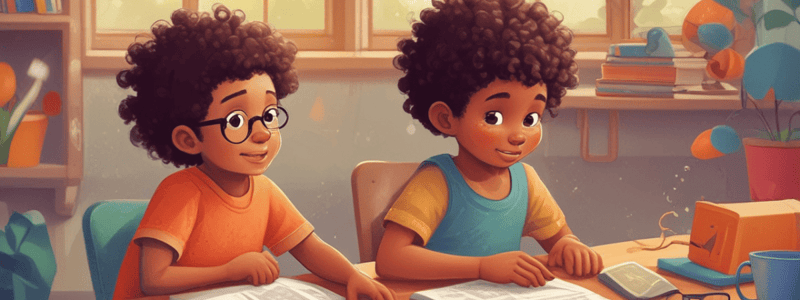Podcast
Questions and Answers
What is the speaker's intention when saying 'make room'?
What is the speaker's intention when saying 'make room'?
- To find a place to sit
- To prepare for the arrival of guests
- To make more space on the table
- To allow other people to enter the room (correct)
What does the speaker want to show?
What does the speaker want to show?
- A steering wheel
- A game
- A movie (correct)
- A painting
What is the speaker encouraging someone to do?
What is the speaker encouraging someone to do?
- To paint (correct)
- To make room
- To go back
- To clean up
What is being opened?
What is being opened?
What is mentioned as being from school?
What is mentioned as being from school?
What is the speaker working on?
What is the speaker working on?
What is being cleaned?
What is being cleaned?
What is mentioned as being in the game?
What is mentioned as being in the game?
What does the speaker say they will be?
What does the speaker say they will be?
What is being saved for lunch?
What is being saved for lunch?
Study Notes
Problem Solving in Preschool Classrooms
- Problem solving is a critical skill in early childhood education, laying the foundation for independent thinking and decision-making.
- It involves helping children identify, analyze, and find solutions to challenges they encounter during activities and interactions.
- Teachers facilitate problem-solving development by setting up structured and unstructured activities that encourage children to explore, ask questions, and experiment with different solutions.
Steps for Guiding Children's Problem Solving
- Anticipate situations where problems may occur, such as during transitions or when sharing toys.
- Be physically available and provide supportive guidance when needed.
- Generate multiple solutions to problems, encouraging children to think critically and come up with their own ideas.
- Celebrate problem-solving success, acknowledging children's hard work and efforts.
Importance of Problem Solving
- Problem solving helps build emotional and social competence, as well as cognitive skills.
- It equips children with confidence and resilience to tackle more complex challenges as they grow.
- Problem solving in the moment can prevent challenging behaviors and teach children useful social skills.
Role of Teachers
- Teachers should resist the impulse to intervene too quickly when children face challenges, allowing them to attempt solving problems on their own.
- Adults should observe and assess the situation to determine if the child is genuinely stuck or simply expressing momentary frustration.
- Providing children with appropriate tools and vocabulary enables them to explore solutions independently before seeking help.
- Guiding questions can be used to stimulate thinking without giving away answers, encouraging children to analyze and evaluate various possibilities.
Promoting Peer Collaboration
- Peer collaboration can be highly beneficial, as children often learn effectively from their interactions with one another.
- Encouraging children to work together and share ideas can help build problem-solving skills and promote social skills.
Post-Reflection
- Post-reflection is vital in consolidating learning and preparing children for future challenges.
- Discussing what strategies worked or did not work helps children reflect on their problem-solving process and develop resilience.
Studying That Suits You
Use AI to generate personalized quizzes and flashcards to suit your learning preferences.
Description
This quiz assesses your understanding of problem solving in a preschool classroom, including helping young children identify, analyze, and find solutions to challenges. It's a critical skill for independent thinking and decision-making in early childhood education.




